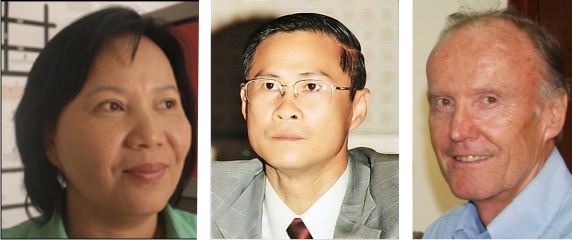 |
AMNESTY INTERNATIONAL
Public Statement
Index: ASA 23/004/2011
Date: 8 June 2011
UN-Cambodia Court: Excessive secrecy, exclusion and fears of inappropriate interference
Amnesty International is gravely concerned that the Extraordinary Chambers in the Courts of Cambodia (ECCC) are moving towards dismissing the cases against additional suspects, amid an atmosphere of excessive and unnecessary secrecy, disciplinary measures jeopardising prosecutors’ independence and reports of political intervention.
As a result, there is an increased risk of undermining the ECCC’s core mission, which is to provide justice to victims of the Khmer Rouge and to the people of Cambodia as a whole, and to leave behind a legacy of respect for the rule of law.
Amnesty International calls upon the ECCC to adopt rules, policies and practices which ensure transparency, accessibility – in particular to victims, vigorous pursuit of investigations and prosecutions, and a firm rejection of any inappropriate or unwarranted interference with the judicial process.
On 29 April 2011 the Co-Investigating Judges announced the conclusion of their investigation into Case 003 apparently without having made use of any of the substantial investigative tools at their disposal.
They did not demonstrate that their decision followed a comprehensive and rigorous investigation, as required by the Court’s Internal Rules and by international standards.
They did not:
- summon and question suspects, charged persons, victims or witnesses;
- seize any exhibits;
- conduct on-site visits;
- seek expert opinions; or
- seek information and assistance from any state, the UN or NGOs.
This unreasonable approach sits uncomfortably close to the expressed wishes of Cambodian political leaders not to see any further prosecutions, and to end ECCC trials once Cases 001 and 002 have been concluded.
Moreover, it did not satisfy even the minimum requirements under international law and standards on the investigation of serious human rights violations, of a prompt, thorough, independent and impartial investigation.
In his statement of 9 May 2011, the International Co-Prosecutor made public for the first time the crime sites and criminal episodes relevant to case file 003, and stated his intent to request further investigative actions as he did not believe the alleged crimes had been fully investigated. He also signalled his intent to request the Co-Investigating Judges for an extension of the deadline for Civil Party applications by victims.
The order subsequently issued by the Co-Investigating Judges against the International Co-Prosecutor, instructing him to retract his public statement illustrates an insistence on an unreasonable level of confidentiality over the right of victims and the public as a whole to be informed of developments within the ECCC.
Moreover, the order puts into question the ECCC’s obligation to safeguard the independence of its prosecutors. The International Co-Prosecutor’s statement contained information useful for victims and the public at large and did not prejudice the rights of any involved persons.
Amnesty International has long been concerned at the imposition of excessively strict rules and policies of confidentiality at the ECCC. Justice must not only be done, but be seen to be done. To the extent that rules and policies of confidentiality are applied other than to protect victims, witnesses and staff, they deprive the Cambodian public of its right to see justice unfold, and, more specifically, deprive victims of their right to be part of the process In particular, excessive confidentiality makes it impossible for victims or the general public to monitor the work of the ECCC effectively and to make useful recommendations for improvement.
The UN Guidelines on the Role of Prosecutors calls on states, among other things, to “ensure that prosecutors are able to perform their professional functions without intimidation, hindrance, harassment, improper interference or unjustified exposure to civil, penal or other liability.” Amnesty International calls upon the ECCC to apply this and other Guidelines in all its dealings with the Prosecutors.
The ECCC must take a long, hard look at its record and current practices. Its proceedings must be transparent, inclusive and follow international standards of fairness. It must conduct vigorous investigations, including into Cases 003 and 004, that meet the strictest standard for such investigations to ensure justice for as many victims as is possible. The existing rules, policies and practices must be reviewed, and where necessary modified to avoid excessive secrecy, exclusion, and vulnerability to inappropriate external interference, which undermines the Chambers’ independence.
Background
The Agreement between the United Nations and the government of Cambodia defines the mandate of the ECCC: “to bring to trial senior leaders of Democratic Kampuchea and those most responsible for the crimes and serious violations of Cambodian laws related to crimes, international humanitarian law and custom, and international conventions recognized by Cambodia, that were committed during the period from 17 April 1975 to 6 January 1979”.
Case 001 against Kaing Guek Eav, known as Duch, the former commander of security prison S-21, is on appeal following his conviction in July 2010 for crimes against humanity and grave breaches of the Geneva Conventions for his role in mass executions, torture and other crimes during the Khmer Rouge period. The Initial Hearing into Case 002 against Ieng Sary, Ieng Thirith, Khieu Samphan and Nuon Chea, will take place on 27 June 2011. They are alleged former leaders of the Democratic Kampuchea government charged with genocide of the Cham and Vietnamese, crimes against humanity, war crimes, and other crimes.
The suspects in Cases 003 and 004 have not been named by the ECCC.
Public Document
****************
For more information please call Amnesty International’s press office in London, UK Phone +44 20 7413 5566 or email: press@amnesty.org
International Secretariat, Amnesty International, 1 Easton St., London WC1X 0DW, UK
Source: ki-media, Amnesty International
